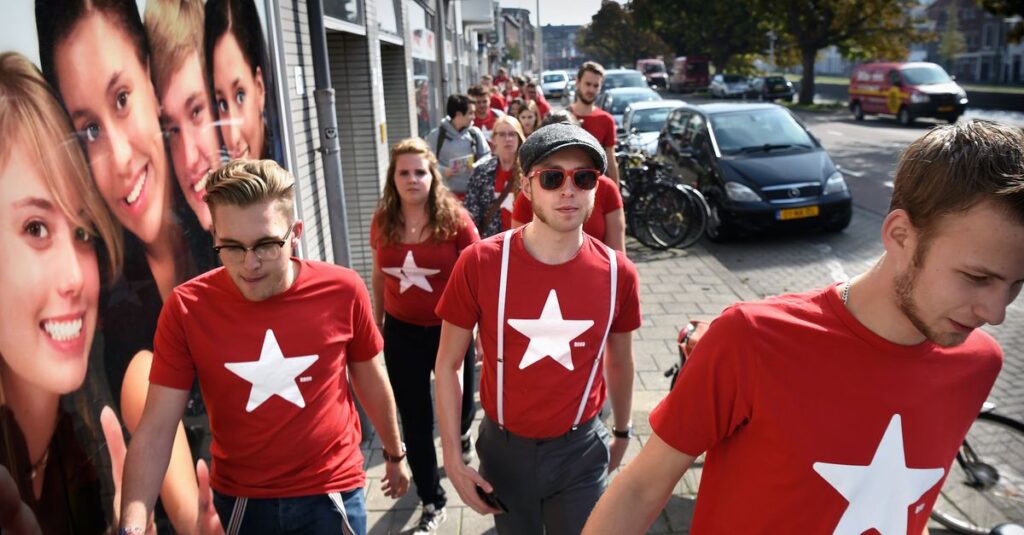The chaiperson of the of the dutch Socialist Party’s (SP) youth-wing, ROOD, and member of the Communist Platform, Olaf Kemerink, spoke to Kosmodromio about the dutch Left, the problems of the youth and what communism means as an idea for the younger generation.
There is a perception in Greece that the wider Left –including of course the SP- was the big loser of the recent elections. Is this true? And if so, what do you think is the main cause behind this development?
Yes, this is true. The parties that I would consider left wing – the Labour Party (PvdA, comparable to PASOK), the Greens (GroenLinks), the Animal Party (Partij voor de Dieren), a party focused on Turkish and Moroccan immigrants (DENK), a new antiracist party (BIJ1) and the Socialist Party (SP) – now scored 36 seats compared to 45 in 2017. This is a historic low. I think the main cause is that most of the left hasn’t really presented itself as an opposition to the current liberal-conservative government and instead wanted to be seen as a reliable coalition partner. The current prime minister, Mark Rutte, gained in popularity because of the Corona crisis and most parties were afraid to confront him too harshly.
The Socialist Party was one of the biggest losers, going from 14 to 9 seats. The SP made it very clear in the campaign that they were prepared to form a coalition government with Mark Rutte’s VVD, the conservative liberal party responsible for the harsh austerity measures and neoliberal reforms of the last 10 years. In the previous election the SP did not want to cooperate with the VVD so this can be seen as a right ward shift towards ‘taking responsibility’. The SP’s core business over the last years was fighting against these reforms from the opposition. With this shift I think that many voters don’t feel the need for the SP and maybe even loses its entire existential purpose.
Besides being chairperson of ROOD you are a member of the Communist Platform, a fact that caused your expulsion from the SP. Could you provide us some context about the Platform’s agenda and its relationship with the SP and ROOD?
The Communist Platform is a communist organisation that is active within the SP. We function as an internal faction, arguing for more internal discussion, transparency and democracy while also trying to push the programme leftward. Over the past year we have argued against the leaderships strategy of aiming for a coalition government, proposing a strategy of principled opposition and revolutionary patience instead.
The Communist Platform has gained a sizeable footing inside ROOD, the youth wing of the SP. Last summer a majority of the ROOD-members have voted in favour of publicly speaking out against joining a government coalition after the 2021 elections. The party leadership found this unacceptable and wanted to purge Communist Platform from ROOD and the SP.
According to the party rules you cannot be a member of another political party, so when the leadership wants to ban a faction they think is annoying they proclaim it as a political party. That is what they also did to the Communist Platform, even though it is obviously not a party. Me and 5 other members were expelled, and meanwhile they presented us in the media as violent and detached from reality.
The ROOD conference still decided to elect me as their chairperson, even though I was already expelled at that point. In reaction the SP decided to halt the funding of ROOD and to appoint a commission to investigatethe situation. They will present their findings before the first of May (how ironic!). In the meantime we acquired donations from angry SP-members and we carried through with our activities as ROOD.
As far as I understand your expulsion from SP is some kind of punishment for being radical. What you believe is the main reason for this right ward shift of SP?
The expulsion is mainly a punishment for being radical in an organised way. They don’t really mind individual radical members, they do not form a threat to the leadership. Organised radical members however can damage the moderate image the party has been building over the last years.
For many years the SP has been accused by the mainstream media and other political parties of being afraid to take on government responsibility. The SP has an image of being an eternal opposition party which the leadership perceives as negative: they want to show the press and the other parties that they are a reliable coalition partner. Organised radical elements do not fit that image. The reason for this shift is that the leadership does not believe in a strategy of patience but wants above all to join a coalition government. To achieve that they are willing to shift to the right.

How has your government treated the youth and society of your country in general in the midst of the pandemic?
The government’s policy has been really inconsistent and has focussed primarily on individual repression. Many people are still forced to go to work every day while they could easily work from home and the government has made no efforts to regulate this. At the same time they have installed a curfew which is disproportionately enforced in poorer neighbourhoods.
What are the top issues that the Dutch youth is facing today from ROOD’s point of view? Education system, unemployment, gender gap, climate change? And what kind of political action do you take on these specific issues as ROOD specifically and SP generally?
I think Dutch youth are mainly concerned with climate change, education and housing. Regarding climate change we work together with many other organisations in organising protests and similar things. For education we have tried to organise students against the recently introduced study loan system which puts students in debts and now we are organising students for compensation of their tuition fees during corona. The housing market in the Netherlands is really bad for young people, everything is expensive and landlords ignore all the rules. We organise tenants against their landlord and hold a ‘Slumlord of the Year’ election every year.
Communism was a dirty word for a long time. Is there more interest in it again you think?
It still is a dirty word in the Netherlands but the younger generation is generally more open to communism as a concept. For many people it is still associated with the Stalinist atrocities in the Eastern Block but I think that is slowly changing. Especially the younger generation realises that the capitalism is unsustainable and because of that they are looking for alternatives. I think that we have showed that there certainly is a basis for communism under Dutch youth, however there is a lot of work to be done to build a sizable movement that can challenge the current order.


